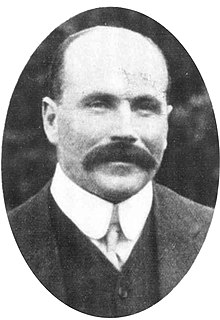William George Ashford (9 August 1874 – 23 March 1925) was an Australian politician.

Early life
editBorn at Sparks Creek near Scone to selector John Ashford and Rebecca Bell, he attended Sparks Creek Public School before starting work on his father's farm. He later bought a farm on the Hawkesbury River, but sold it to return to Sparks Creek. Around 1904 he married Lily Charlotte Keys Brecht, with whom he had four sons.[1]
Parliamentary career
editHe stood for election to the New South Wales Legislative Assembly as the Labor candidate for Upper Hunter at the 1907 election, but was unsuccessful. In 1910 the sitting member William Fleming (Liberal Reform) resigned to unsuccessfully contest a federal seat at the 1910 election and Ashford won the April 1910 by-election. He was defeated 6 months later at the general election in October.[2] In 1911 a vacancy arose at Liverpool Plains due to the resignation of Henry Horne (Labor). Ashford was defeated at the by-election in August 1911 with a margin of 3 votes and 91 informal votes.[3] He challenged the result before the Elections and Qualifications Committee,[4] which declared the election void.[5] Ashford comfortably won the subsequent by-election in October 1911.[6]
Ashford was a minister in the Holman Labor ministry, being Minister of Agriculture from 29 January 1914 until 23 February 1915 and again from 15 March to 1 June 1915, and Secretary for Lands from 12 January 1915. He was expelled from Labor on 7 November 1916, along with Holman and 21 others, for defying party policy and supporting conscription.[7] He joined Holman's grand coalition with the members of the various conservative parties,[8] which by 1917 had coalesced into the Nationalist Party. In the Second Holman ministry he retained the office of Secretary for Lands, but added a new role as Minister for Forests. Ashford acted as Minister of Agriculture from October 1919 and was appointed to the role on 9 February 1920, holding the 3 ministries until the defeat of the Nationalist government at the April 1920 election.[9]
In 1920, with the introduction of proportional representation, he was the only Nationalist member for the 3 member district of Wammerawa. He stood as an independent at the 1922 election and the returning officer declared that Ashford had been re-elected. The result was overturned by the Elections and Qualifications Committee who declared that Joseph Clark had been elected instead.[10]
Death
editReferences
edit- ^ a b "The Hon. William George Ashford (1874-1925)". Former members of the Parliament of New South Wales. Retrieved 3 May 2019.
- ^ Green, Antony. "Elections for the District of Upper Hunter". New South Wales Election Results 1856-2007. Parliament of New South Wales. Retrieved 25 November 2019.
- ^ Green, Antony. "August 1911 Liverpool Plains by-election". New South Wales Election Results 1856-2007. Parliament of New South Wales. Retrieved 2 December 2019.
- ^ "Petition of William George Ashford". Government Gazette of the State of New South Wales. No. 127. 19 September 1911. p. 5065. Retrieved 2 December 2019 – via Trove.
- ^ "Unseated: Liberals lose a member". The Sydney Morning Herald. 4 October 1911. p. 17. Retrieved 2 December 2019 – via Trove.
- ^ Green, Antony. "October 1911 Liverpool Plains by-election". New South Wales Election Results 1856-2007. Parliament of New South Wales. Retrieved 2 December 2019.
- ^ "PLL expulsions". The Sydney Morning Herald. 7 November 1916. p. 7. Retrieved 7 May 2020 – via Trove.
- ^ "Proceedings in the Assembly: censure motion defeated". The Sydney Morning Herald. 11 November 1916. p. 13. Retrieved 7 May 2020 – via Trove.
"No state crisis". The Sydney Morning Herald. 13 November 1916. p. 6. Retrieved 7 May 2020 – via Trove. - ^ "Part 6 Ministries since 1856" (PDF). NSW Parliamentary Record. Parliament of New South Wales. Retrieved 28 October 2020.
- ^ Green, Antony. "Elections for the District of Wammerawa". New South Wales Election Results 1856-2007. Parliament of New South Wales. Retrieved 30 August 2019.